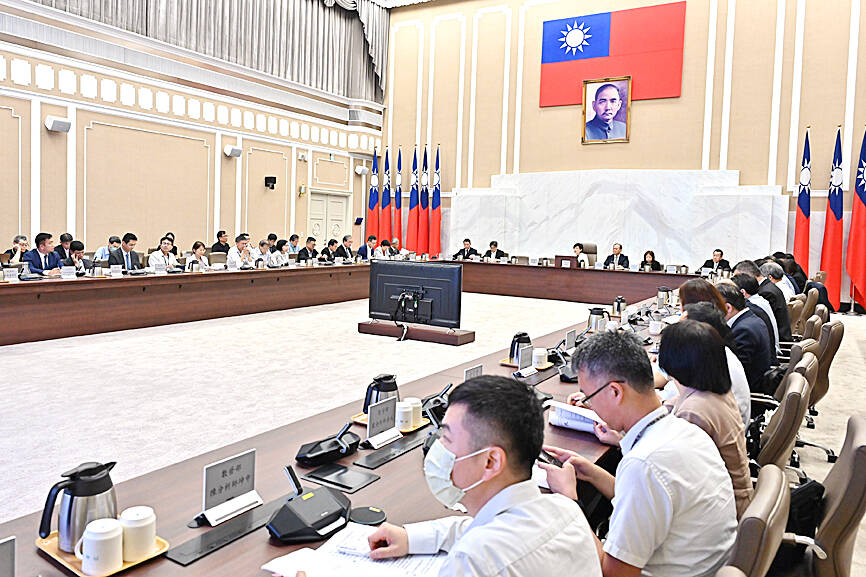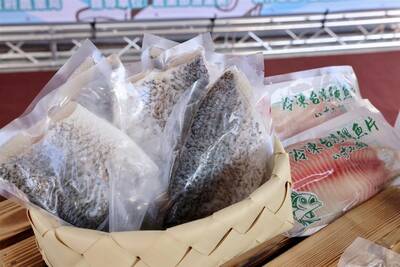The Second Special Police Corps’ presence at critical infrastructure has improved the protection of such sites, and critical infrastructure personnel are beginning to propose countermeasures against possible security risks posed by uncrewed aerial vehicles (UAV) and drones, Executive Yuan Vice Premier Cheng Li-chun (鄭麗君) said on Monday.
Cheng also instructed the Second Special Police Corps to help identify possible threats to critical infrastructure and establish standard countermeasure protocols.
She was discussing the Executive Yuan’s first national security policy report of the year, produced by the Homeland Safety Office on critical infrastructure countermeasures against UAVs and drones.

Photo courtesy of the Executive Yuan
All critical infrastructure facilities have proposed measures to establish no-fly zones and improve detection and interference capabilities along their perimeters, the report said.
The authorities are expected to collaborate with the Homeland Safety Office in implementing the policies and provide the government with statistics for joint systems defense drills, Cheng said.
The office said all units are to hold routine drills to ensure that all critical infrastructure facilities can deter UAVs and drones, she said.
The Executive Yuan would continue to instruct all ministries to inventory and provide adequate protection for all critical facilities and nodes under their jurisdiction, Cheng said.
Ministries should ensure that protective measures take into account all forms of disasters, natural or otherwise, and that measures are routinely examined and revised to achieve the utmost resilience, she said.
The Executive Yuan’s annual national security policy report was established to ensure that government systems work together to maintain national security.
Critical infrastructure is defined as physical and digital public or privately owned assets, manufacturing systems and networks that, if sabotaged or damaged by natural disasters, would affect the running of the government or society; cause injuries or death, an economic recession or changes to the environment; or undermine the nation’s welfare.

Taiwan's Vice President Hsiao Bi-khim (蕭美琴) said Saturday that she would not be intimidated by the Chinese Communist Party (CCP), following reports that Chinese agents planned to ram her car during a visit to the Czech Republic last year. "I had a great visit to Prague & thank the Czech authorities for their hospitality & ensuring my safety," Hsiao said on social media platform X. "The CCP's unlawful activities will NOT intimidate me from voicing Taiwan's interests in the international community," she wrote. Hsiao visited the Czech Republic on March 18 last year as vice president-elect and met with Czech Senate leadership, including

There have been clear signs of Chinese Communist Party (CCP) attempts to interfere in the nationwide recall vote on July 26 in support of Chinese Nationalist Party (KMT) legislators facing recall, an unnamed government official said, warning about possible further actions. The CCP is actively involved in Taiwanese politics, and interference in the recall vote is to be expected, with multiple Chinese state media and TAO attempts to discredit the Democratic Progressive Party (DPP) and undermine public support of their recall movement, the official said. This interference includes a smear campaign initiated this month by a pro-Beijing Hong Kong news outlet against

A week-long exhibition on modern Tibetan history and the Dalai Lama’s global advocacy opened yesterday in Taipei, featuring quotes and artworks highlighting human rights and China’s ongoing repression of Tibetans, Hong Kongers and Uighurs. The exhibition, the first organized by the Human Rights Network for Tibet and Taiwan (HRNTT), is titled “From the Snowy Ridges to the Ocean of Wisdom.” “It would be impossible for Tibetans inside Tibet to hold an exhibition like this — we can do it. because we live in a free and democratic country,” HRNTT secretary-general Tashi Tsering said. Tashi Tsering, a Taiwan-based Tibetan who has never

A first shipment of five tons of Taiwan tilapia was sent from Tainan to Singapore on Wednesday, following an order valued at NT$600,000 (US$20,500) placed with a company in the city. The products, including frozen whole fish and pre- cooked fish belly, were dispatched from Jiangjun Fishing Harbor, where a new aquatic processing and logistics center is under construction. At the launch, Tainan Mayor Huang Wei-che (黃偉哲) called the move a “breakthrough,” marking Taiwan’s expansion into the Singaporean tilapia market. Taiwan’s tilapia exports have traditionally focused on the United States, Canada, and the Middle East, Huang said, adding that the new foothold in